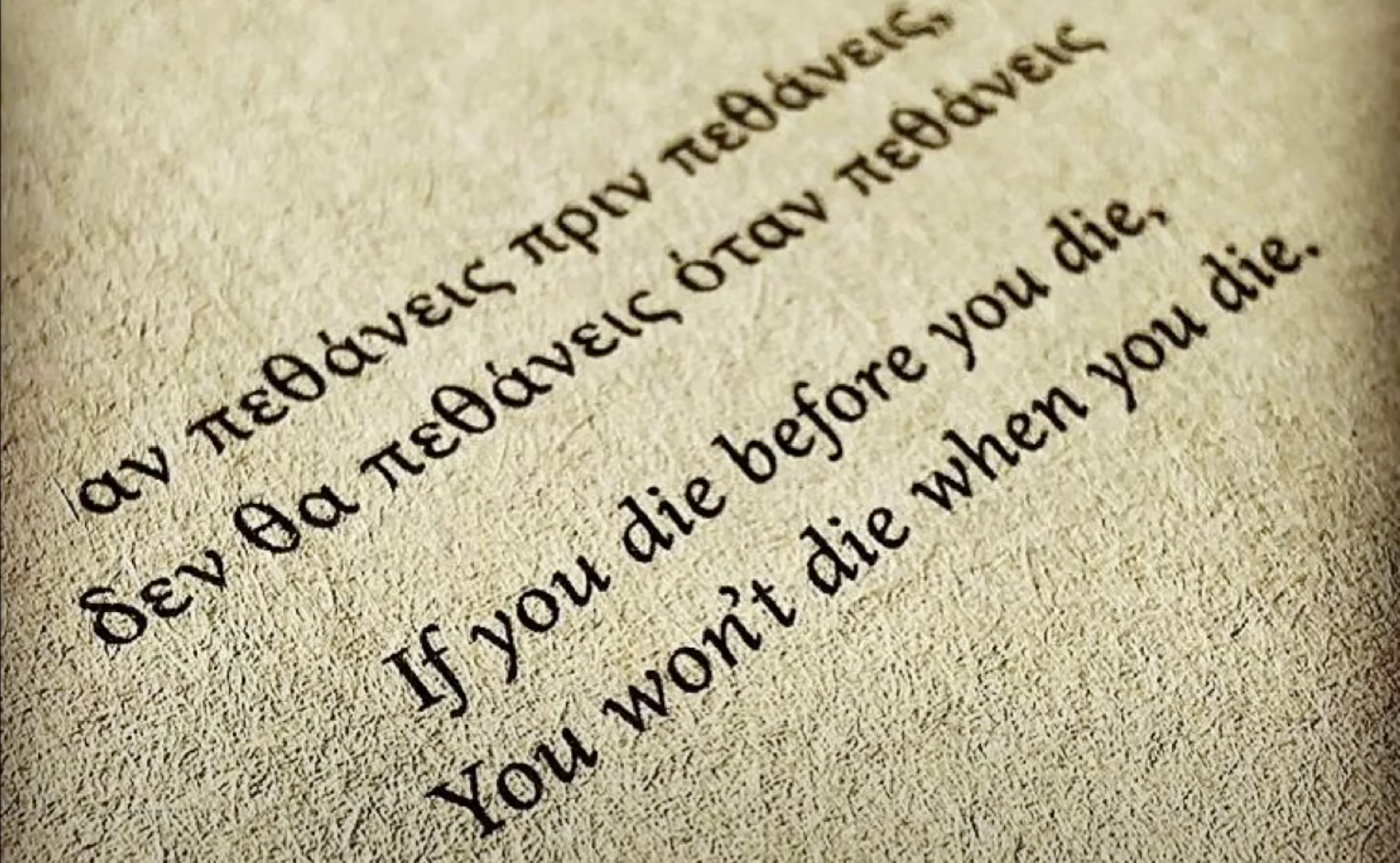If You Die Before You Die, You Won't Die When You Die

Intro
Fundamental to death and resurrection tradition across many religions.Breakdown
If you die- If you experience death / resurrection (initiatory experience; unity with all; death of ego; etc)
- We're talking about symbolic death, or more specifically The Mystery, not actual death.
- during your lifetime
- you won't have a bad or hellish trip
- you will not “die” in the sense of fear, confusion, or disintegration when the body dies — because you’ve already traversed that boundary consciously.
- the Orphic and Platonic teaching: the initiate's consciousness is “awake”; living the aionion zoē (aionic life / timeless mental state). Understanding presence, able to defeat fear.
- when you actually die (physical death)
- to the uninitiated, this is terror and oblivion; to the initiate (who's conscious is oriented to aionic life), it is simply the final release of whatever will come, or something already known.
Origins
Its roots are older and Hellenic, reappearing in Orphic, Platonic, and mystery-cult contexts long before the Christian ascetics repeated it.
Earliest conceptual source — Orphic and Eleusinian mystery tradition
The formula summarizes the initiatory logic of the mysteries:
- “To die before dying” = to undergo ritual death (μύησις, τελετή) — ego-death, descent into Hades, the symbolic dissolution of the mortal self during initiation.
Those who had “died before they died” (the initiates) were said to achieve true life beyond death, whereas the uninitiated “twice die.”
See:
- Plato, Phaedo 64a–69e — the philosopher “practices dying” (μελετᾶν τὸ τεθνάναι).
- Plato, Phaedrus 250c — the purified soul regains its wings.
- Orphic Gold Tablets — inscriptions buried with initiates say:
- “I am a child of Earth and starry Heaven, but my race is of Heaven alone... I have flown out of the sorrowful cycle.”These presuppose one who has “died” ritually and thus will not “die” truly.
So the concept “If you die before you die, you will not die when you die” is Orphic-Platonic in origin.
Later formulations
The saying itself is recorded most explicitly in Christian mystical sources that reinterpreted this Orphic and Platonic insight:
- Meister Eckhart (c. 1260–1328 CE) — German Dominican mystic, said:
- “The man who dies before he dies, does not die when he dies.”(Middle High German: Der mensche, der vor dem tod gestorben ist, stirbet nit, so er stirbet.)
- Sufi tradition — The same idea appears in Arabic centuries earlier as a prophetic hadith:
- موتوا قبل أن تموتوا (mūtū qabla an tamūtū)“Die before you die.”Here again, it refers to annihilating the ego (fanāʾ) before physical death.
The Sufi and Eckhartian forms are both descendants — through Hellenistic and Alexandrian channels — of that Orphic initiatory formula:
- to die while living is to awaken into the immortal realm.
Sources
A concise paraphrase of all the sources:
He who practices death while alive will find no death when he dies.
This line expresses one of the oldest initiatory formulae known, it does not come verbatim from any single ancient Greek text, but it condenses a theme found repeatedly across Orphic, Platonic, and later Christian mystical writings.
Greek Origins — Plato
οἱ γὰρ ὀρθῶς φιλοσοφοῦντες ἀποθνῄσκειν μελετῶσιν... καὶ ὡς ἀληθῶς τεθνήκασιν οἱ τοιοῦτοι.
“Those who rightly practice philosophy are practicing dying, and to them of all men death is least terrible.”This is the earliest explicit expression of “practicing death while alive.”Plato describes philosophy (and by extension, initiation) as meletē thanatou — “the rehearsal of death.”
Orphic and Mystery
νῦν ἔθανες καὶ νῦν ἔγενου, τρὶς ὄλβιε.
“Now you have died and now you are born again, thrice-blessed one.”
This expresses the same principle: one who has “died before” through initiation has already passed the true death, and so achieves divine rebirth.
Gnostic and Christian
The formula survives in early Christian mystical traditions:“Blessed is the one who has taken his place in the beginning; he will know the end and will not taste death.”
“Blessed is the one who has recognized himself; he has entered the Kingdom.”
“He who dies before he dies does not die when he dies.
See Also
- Immortality Key - book by Brian Murarescu, the religion with no name behind all
- LadyBabylon - books and livestreams from Dr DCA Hillman, revealing the ancient mystery.